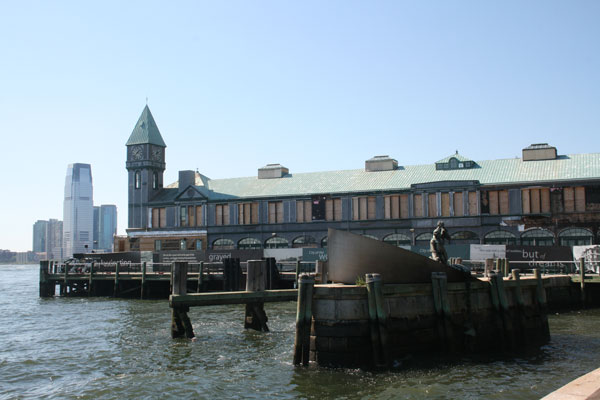
BY ALINE REYNOLDS | Another upscale restaurant is the last thing Lower Manhattan needs, according to a group of Italian-American activists who are protesting the current redevelopment plans for Pier A in Battery Park City.
In early March, the Battery Park City Authority awarded the lease of the pier to Downtown restaurateurs Harry and Peter Poulakakos, who plan to open up a high-end restaurant there with an oyster bar and outdoor seating. The newly renovated pier is also slated to have a coffee shop, a visitor’s center and entertainment venue, and a public plaza and promenade, according to the B.P.C.A.
Community Board 1 member John Fratta and other Downtown residents are arguing that the dockside building should instead house a museum honoring the heritage of Italian-Americans and their role in shaping New York City.
“It’s the last unoccupied historic building in Battery Park City. To give that building over to a restaurateur that’s going to open up a high-end restaurant [instead of] a museum is a crime,” said Fratta, who recently formed the National Italian-American Action Network, a grassroots organization devoted to advocating for their rights and countering bigotry against Italian-Americans.
Italian-American activist Joseph Grano, chairman and chief executive officer of Centurion Holdings, a financial advisory firm, formally proposed to transform the pier into a world-class Italian-American museum with a 4,000 square-foot restaurant. Grano offered the B.P.C.A. an annual lease of close to $1 million for the space, which he anticipated would attract between 150,000 and 200,000 visitors a year.
The institution Grano envisioned for the pier would be “an iconic hub coalescing Italian-American organizations across the country.”
“The last thing downtown needs is another restaurant,” Grano said. “I’m hopeful the [B.P.C.A.] will reconsider our submission.”
The N.I.A.A.N. held a rally on Sat., June 25 near Pier A, calling on the B.P.C.A. to reopen the bidding process for the pier. Italian-Americans deserve an institution of their own to commemorate their hard work on American soil since settling here in 1635, the protestors said.
“The bottom line is, they gave the Jewish community the [Museum of Jewish Heritage], they gave the Irish community the Irish Hunger Memorial. And yet, when it came to us, they basically snubbed their nose at us,” said Fratta. “Out of fairness, our community should have a presence in this area.”
“If we are willing to live in this community, to come here from foreign shores and raise families, and then in fact to die in the service of this community, then why not have a building to commemorate — as we have with those of Jewish, Irish and Native American [roots] — Italian-American heritage?” said Jean Grillo, district leader for the 66th Assembly District and the daughter of an Italian immigrant.
Grano is not partaking in the protests.
“We of course were very disappointed we didn’t get the award, but I have no desire to fight it or politicize it at all,” said Grano. “The process appeared to be professional, and we lost.”
The N.I.A.A.N. is also accusing the B.P.C.A. of awarding the Pier A lease to the Poulakakos’ without adequately consulting the community.
“This deal stinks — it is backroom deals with absolutely no transparency or public meetings. And we want to know what’s going on,” said C.B. 1 member Marc Ameruso.
The N.I.A.A.N. submitted a Freedom of Information Act request in late March, demanding to see meeting minutes and other documentation that lead to the agency’s decision. So far, the group hasn’t received the written material they’ve asked for, Fratta said, and is now threatening to take legal action against the B.P.C.A. for withholding lease-related information.
“We believe there’s a real serious problem with the process — it was not transparent, and there was no community involvement,” said Fratta. “Down the road, there probably will be [another] lawsuit if we find something that’s been done wrong.”
The group is particularly outraged that the pier will be operated by a commercial entity. The plans exhibit corporate greed, according to George Altomare, founder and co-chairman of the United Federation of Teachers’ Italian-American Committee.
“Even if it weren’t a matter of Italian-Americans getting their due, there should not be public property… used for high-ended restaurants,” said Altomare.
“If you or I, or any New Yorker or American, wants to step into that building… you’re going to have to take out your wallet… and spend a lot of money for dinner here,” said Arthur Piccolo, chairman of the Bowling Green Association.
The B.P.C.A. didn’t return several requests for comment.
Chairman of the B.P.C.A., Bill Thompson, Jr., applauded the lease agreement in March, saying at the time, “As part of our ongoing efforts to rebuild lower Manhattan, the restoration of Pier A will create hundreds of new jobs and provide residents and visitors with even more dining and recreational options in the area.”
The Poulakakos’ vision of Pier A, Thompson continued, “will revitalize the historic pier and bring first-class dining and events to Battery Park City.”
The pier, constructed in 1886, was originally used as an outpost for the New York Harbor Police and the City Department of Docks.



































